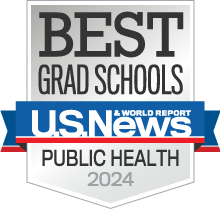The Learning Collaboratory: Applied Public Health in the Community

The Learning Collaboratory – a three-to-four semester program offered at the Miller School of Medicine’s Department of Public Health Sciences – gives graduate students in master programs the opportunity to apply public health in the classroom and community. The program, first offered in 2014, fosters the development of new students as they transition into becoming public health practitioners while promoting the continuity and impact of their capstone and thesis projects in the community across time.
The Collaboratory consists of three courses across three subsequent semesters. The initial course, labeled as EPH 679, introduces students to various public health concepts and skills. Students work with their thematic group leaders, community partners and fellow students to apply what they have learned as they complete their capstone experience or master’s thesis across the three semesters. The program is led by Viviana Horigian, M.D., M.H.A, and Tatiana Perrino, Psy.D., who are associate professors in the department and who developed the program.
“The idea is to give students a much deeper and quicker understanding of public health competencies as soon as they start the program. During EPH 679, they learn competencies that are critical to public health,” said Dr. Perrino. “And then while they're learning them, they're applying those skills during the class because we also have sessions that are out in the community. We'll go visit these community agencies and then we'll be talking immediately about how they can do needs and capacity assessments, apply problem-solving skills, and so on.”
In the first semester, students have visited Judge Jeri Cohen’s court, the University of Miami Pediatric Mobile Clinic, ConnectFamilia, and the University of Miami’s Leadership in Neurodevelopmental Disabilities.
Kurrdeige Alexander, a second-year student in the Master of Public Health (M.P.H.) program, is in the third semester of the program and said that she enrolled in the program because she wanted to have guidance throughout her practical experiences in public health.
“Each week we focused on a different skill or topic supported with real-world examples and discussions. Class was also an opportunity for us students to update our classmates and professors on our practical experiences progress. Here the professors would always encourage classmates to provide feedback and guidance to their peers,” Kurrdeige said.
“The sessions each Monday are centered around different aspects of what fieldwork and, eventually, what public health work will entail,” added Renae Schmidt, a second-year M.P.H. candidate. “Using critical and applied thinking, we strategize around community-partner topics, such as needs assessments, program evaluations, readiness for change, logic models, and community engagement.”
The program offers five different thematic groups, which are led by primary, secondary and voluntary faculty at the department. Students can choose one and are interviewed by group leaders before they are officially a part of a group.
The groups include Access to Health Care for Children led by Lisa Gwynn, D.O., Health in Latin America led by Dr. Horigian, and Nelson Arboleda, M.D., Prevention with Children and Families led by Dr. Perrino, Urban Health led by Scott Brown, Ph.D., and HIV and Substance Use led by Adam Carrico, Ph.D. They meet weekly in large group sessions with Dr. Horigian, Dr. Perrino, and their thematic group leaders, as well as individually with their group leaders.
During the final fall semester, students help mentor and teach incoming students in the subsequent year’s collaboratory cohort group, under the supervision of Dr. Horigian and Dr. Perrino.
“During that final fall semester, students co-facilitate sessions for the incoming cohort and pass the learning experience of their projects on to the new incoming class. From an evidence-based teaching perspective, this is called teach-back,” Dr. Horigian said. “They have to sit back, reflect, and give back. That's when the most important learning experience occurs.”
Graduate students enrolled in the Collaboratory describe it as an enriching and rewarding component in their graduate studies.
Natalie Robles, a second-year M.P.H. candidate, said “The course has been key to my continued development as a public health professional. I think it is a unique experience to be a part of a group of students that are working towards similar goals while also having the opportunity to discuss ideas and learn from one another.”
“I would absolutely recommend the Learning Collaboratory to anyone who is interested. This is a great opportunity for anyone who is looking for structure and guidance when working on a capstone or thesis,” added Aiden Wells, a first-year candidate in the M.P.H./L.A.S. program. “The structure of the Learning Collaboratory has you think about your culminating master’s experience early on and provides you with a wide variety of tools to set you up for success.”
Written by Amanda Torres
Published on December 11, 2019





